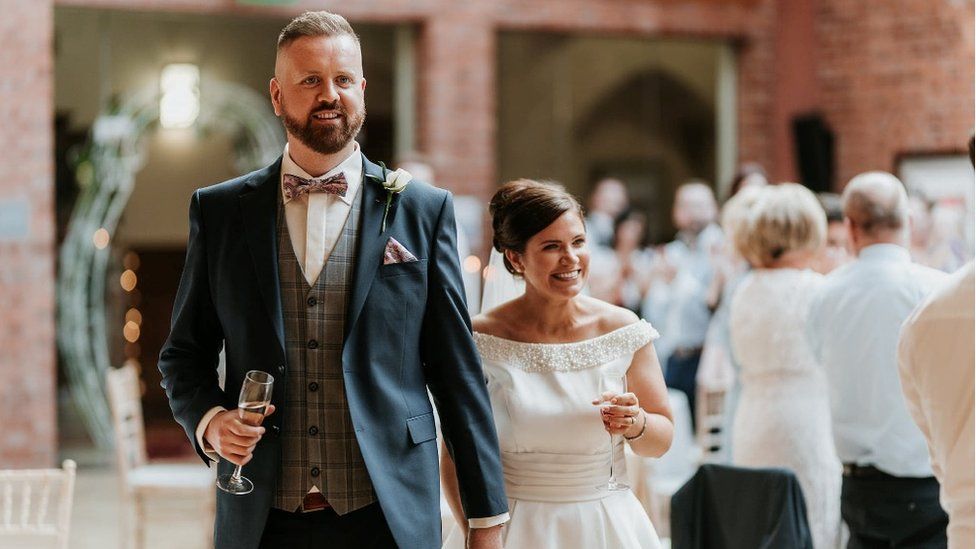Humanist weddings: Non-religious weddings rise in Northern Ireland
- Published

Demand for humanist wedding ceremonies has risen dramatically since they were legally recognised in Northern Ireland a year ago.
About 180 couples are expected to have a humanist wedding in 2019, up from 60 in 2018 and an average of about 10-15 a year before that.
It comes as the proportion of weddings in NI which are non-religious rises.
Northern Ireland and Scotland are the only parts of the UK where humanist ceremonies are legally recognised.
Humanist weddings are non-religious ceremonies which are conducted by a humanist celebrant.
Before summer 2018, couples could have a humanist wedding, but had to have a separate ceremony at a register office in order to be legally married.
Campaign group Humanists UK, the accrediting body for celebrants who are able to carry out legally-recognised ceremonies in NI, says humanist weddings are different from many other more traditional civil ceremonies because they are intended to be entirely hand-crafted and reflective of the couple's humanist beliefs and values.
Stewart Holden, head of the humanist celebrant network in Northern Ireland, said more and more couples were becoming interested in humanist weddings, particularly after attending one as guests.
"Many people in Northern Ireland still say on paper they are a Catholic or a Protestant as a community background, but in practice they have no interest," he said.
"When it comes to picking where to get married they think: 'Do we really want to get married in a church?'
"People are doing it for many reasons. With a humanist ceremony you can really celebrate the couple.
"People come along to a humanist wedding and they see it for themselves or they hear it from a friend - they see people laughing and crying at various points in the ceremony - and they think: 'Why don't we look at the humanist option?'"
'We wanted something personal'
Emma Taylor and Paul Malone were the first couple to be married in a legally-recognised humanist ceremony in Northern Ireland after they were made available to all couples.
Ms Taylor, a buyer at pharmaceutical company Almac, and Mr Malone, who works in marketing and communications at Queen's University Belfast, tied the knot at the university's Whitla Hall in a ceremony led by Mr Holden on 25 August 2018.
"Since we got engaged we knew we did not want a traditional Catholic wedding," Mr Malone said.
"We were born Catholic but do not practise. We wanted something more personal to us.
"We came across humanism and it was the perfect thing for us.
"We were supposed to get legally married three or four days before in the council offices, but then the law changed and the way it turned out was perfect.
"Our ceremony was very short and sweet. We didn't want to be there all day and everyone was delighted by that.
"It was about 30 minutes long and instead of religious readings, my nephews and a couple of friends read some funny poems and lyrics from a Johnny Cash song.
"I have got friends who are getting married with Stewart (Holden) this week. After our wedding they asked how it went and said it would suit them.
"A lot of it was educating people that humanism is not a religious cult, there is no hidden agenda. It is personal to you.
"You can take all the bits of a traditional wedding that you like and leave the rest that you don't."
The first legally-recognised humanist ceremony in Northern Ireland took place in 2017 when model and activist Laura Lacole married professional footballer Eunan O'Kane after they took a legal challenge to try to change the law.
The High Court allowed them to have a legal humanist marriage, but no other couples were able to do so as the attorney general of Northern Ireland appealed against the decision.
In June 2018 the Court of Appeal ruled in favour of Ms Lacole and Mr O'Kane, allowing all couples to be able to have legally-recognised humanist marriages.
Humanist marriages were legalised in Scotland in 2005 but remain illegal in England and Wales, where couples still have to have a separate register office ceremony.
"Couples are astonished when I tell them that humanist ceremonies are legally recognised here but not in England or Wales," said Mr Holden.
"The marriage laws there are so archaic, they will need a complete re-write".
In Scotland the number of humanist ceremonies reached 5,702 in 2018, more than the Church of Scotland and the Catholic Church combined.
In Northern Ireland, humanist ceremonies remain a small percentage of all marriages.
In 2017 - the most recent year statistics are available for - there were 8,300 marriages, of which 5,357 were religious.
But the number of marriages at registrar's offices - 2,943 - was at its highest level.
"I am a firm believer that people who are religious and feel that is an important part of their life should have a religious wedding," said Mr Holden.
"But I think it is a terrible shame that there are people who get married who have no real interest in religion but end up having a religious wedding that does not reflect their life and the way they see the world.
"We are really, really strict that our ceremonies are non-religious, but not anti-religious in any way."
- Published10 March 2019
- Published28 June 2018
- Published18 June 2015
- Published22 June 2017